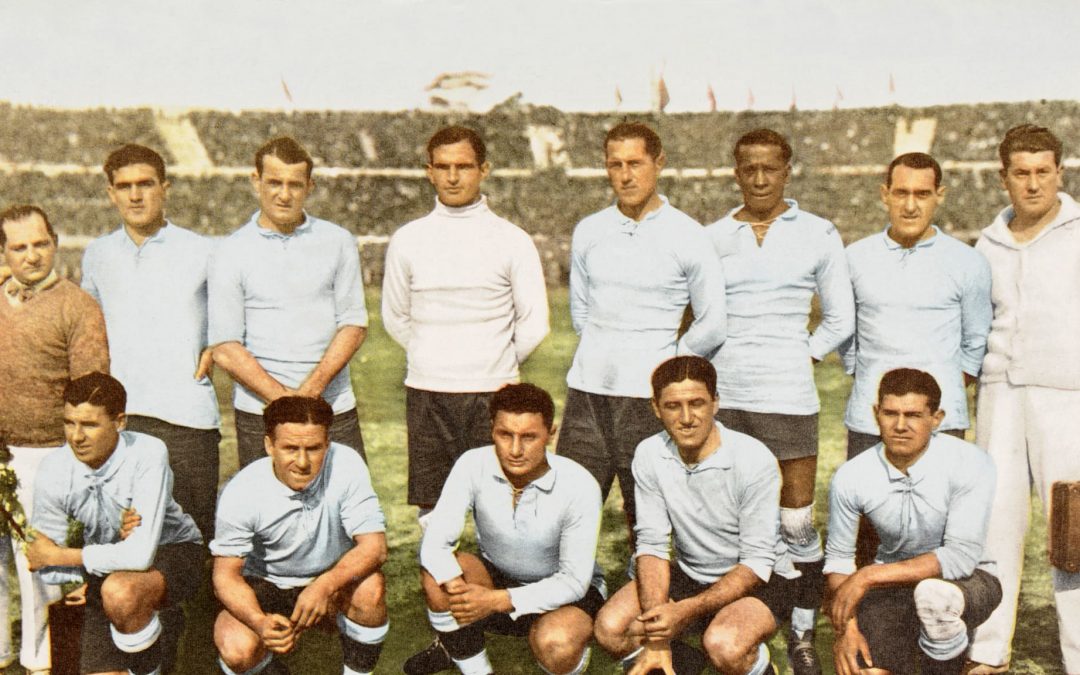The first ever FIFA World Cup took place in Uruguay from 13 July to 30 July 1930. Uruguay who were arguably the best side in those times, had been crowned as first World Cup champions. The tournament was the first major step to take the game to the global stage. And thus, the world’s most popular sporting extravaganza was born giving birth to the new religion of football. Let us have a look at how it all started.
When FIFA was formed in 1904 its membership was comprised of only seven teams, all from Europe. Over the next two decades more and more national sides joined FIFA, and the 1924 Olympic football tournament was the first one to involve non-European teams with Uruguay, the United States, Turkey and Egypt all taking part. Uruguay won the gold medal and would go on to retain it four years later. But the Olympic football tournament, organized by FIFA starting with the 1920 edition, was only open to amateurs, which meant many of the world’s best players were unable to take part. Therefore in 1926, FIFA – led by their president Jules Rimet and the secretary of the French Football Association, Henri Delauny – decided to create their own tournament which would be open to all players, amateur and professional. After two years of deliberations FIFA announced that a new tournament, the World Cup, would begin in 1930 and take place every four years.
At the time for the event, an economic depression took place in Europe. The travel expenses hindered some teams and many of the European players were reluctant to leave their countries on a long trip, afraid that they would lose their jobs – this was long before it became normal with football players playing for a living. The idea that professionals would be allowed caused a lot of controversy and aversion (only amateur players were traditionally allowed in the Olympics). That was the reason for Denmark and Germany to refuse to take part. Of prestigious reasons England would also refrain from participation. For a while it looked like none of the Europeans countries would make the trip to Uruguay and the first World Cup was in danger. In the end three European nations would send their teams to Uruguay. Unfortunately, none of these were among the highest ranked teams. Many of the best European teams would be absent, such as Austria, England, Hungary,
The first ever World Cup game was played between France and Mexico on July 13, 1930, at the tiny Estadio Pocitos stadium. The stadium, which was owned by the reigning Uruguayan champions Peñarol, had a capacity of only a thousand and it was a crowd of this size that saw the 22-year-old French forward Laucien Laurent, of FC Sochaux, score the first ever World Cup goal after 19 minutes to help France to a 4-1 win in Group 1. It would be Argentina who would go on to win Group 1, made up of four participants – Chile were the other team involved – thanks to three wins out of three. The other three groups contained only three teams. Yugoslavia, whose complicated trip to the tournament obviously did not hinder them too much, won Group 2 thanks to victories over Brazil and Bolivia. Uruguay came out on top of Peru and Romania in Group 3, whilst the United States triumphed over Paraguay and Belgium in Group 4. In the United States’ 3-0 win over Paraguay confusion over the identity of the scorer of the American’s second goals meant that, for 76 years it was thought that the first ever World Cup hat-trick had been scored by Guillermo Stábile of Argentina in their 6-3 win over Mexico two days previously. It was only in 2006 that the second US goal was finally credited to Bert Patenaude, who had scored their other two goals against Paraguay thus giving him the credit of the first hat-trick instead. Yugoslavia, the only European team left in the competition, were thrashed 6-1 by the hosts with Pedro Cea notching three Amazingly the score-line was repeated in the other semi-final with Argentina triumphing over the hapless United States. After being 2-1 down to their South American neighbors at half-time Uruguay scored three second-half goals to make the final score to add the first ever Jules Rimet trophy to their two Olympic gold medals. Stábile’s 37th minute goal gave him eight in total for the tournament, three more than Pedro Cea of Uruguay. And that is how Uruguay added the first crown to their name in front of a proud home crowd.
![]()

